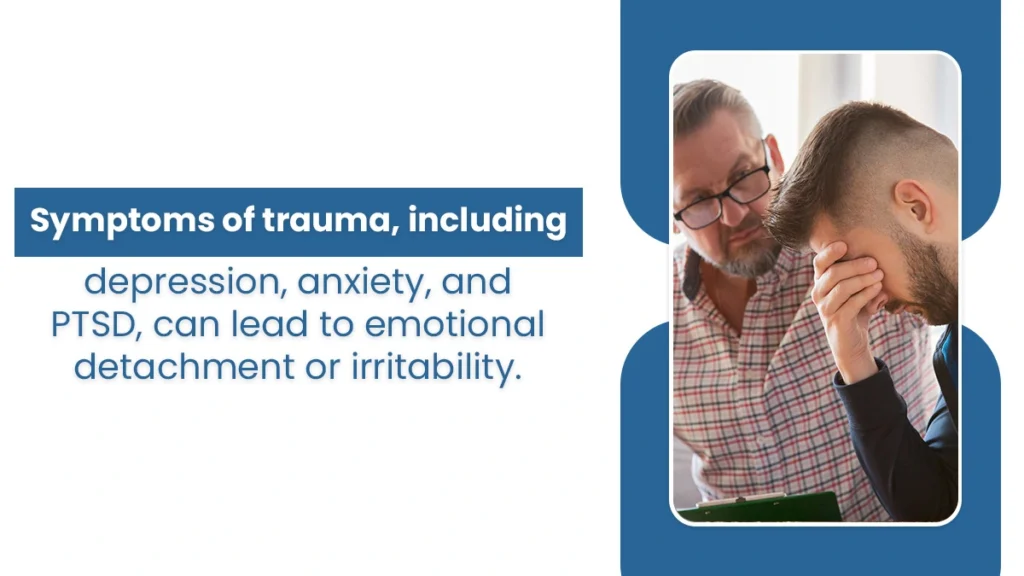Emotional trauma is the lasting impact of overwhelming events or stress that exceeds one’s coping ability. In adults, signs of emotional trauma may manifest in disrupted sleep, intense anxiety, and difficulty concentrating. Emotional withdrawal, irritability, and a diminished sense of self-worth are common indicators.
Physical symptoms like headaches and digestive issues may also emerge. This article recognizes and addresses emotional trauma, promotes healing, and enhances well-being.
Key Takeaways
Trauma significantly impacts mental health, affecting thoughts, emotions, and behaviors. Here’s what you need to know:
- Early identification of behavioral changes, altered mood, and physical symptoms is crucial in addressing emotional trauma.
- Symptoms of trauma, including depression, anxiety, and PTSD, can lead to emotional detachment or irritability.
- For healing and recovery from emotional trauma, adults must acknowledge it, seek professional help, and create a supportive environment.
The Haven Detox-Little Rock provides expert support for mental health issues. Contact us at (501) 271-3342 for more information.
Trauma Explained
Trauma, a profound emotional response to distressing events, encompasses experiences exceeding our ability to cope. It stems from diverse sources, including abuse, accidents, or loss, imprinting lasting effects on mental well-being.
Adults often exhibit signs like disrupted sleep, intense anxiety, and diminished self-worth. Emotional withdrawal and irritability further indicate trauma’s impact. Physical symptoms such as headaches may also surface.
Addressing trauma is crucial for promoting resilience, restoring emotional balance, and overall well-being in individuals.
Identifying Signs of Emotional Trauma
Identifying signs of emotional trauma involves observing changes in behavior, such as sudden mood swings, withdrawal from activities, or difficulty concentrating. Physical symptoms like headaches and fatigue can also indicate emotional distress. Pay attention to shifts in sleeping and eating patterns.
Emotional trauma may manifest as irritability, anxiety, or feelings of helplessness. Persistent nightmares or flashbacks may signal unresolved trauma.
Additionally, watch for a decline in personal hygiene and increased substance use. It’s crucial to offer support and encourage professional help if needed.
Physical Signs
Physical signs of trauma may manifest in various ways. Individuals might experience heightened arousal, increased heart rate, rapid breathing, or trembling. Alternatively, some may exhibit dissociation, appearing detached or emotionally numb. Sleep disturbances (insomnia or nightmares) can also be prevalent.
Chronic muscle tension may arise due to the body’s physiological response to stress. Gastrointestinal issues, headaches, and changes in appetite are additional physical indicators.
Mental and physical well-being are linked. Trauma recovery should address both aspects holistically.
Emotional Signs
Trauma can show in mental and emotional ways. People may feel intense fear, sadness, or anger. Flashbacks, where past events feel real again, can happen. Avoidance of reminders is common. Sleep troubles, like nightmares or insomnia, may occur.
Some might struggle with concentration and memory. Emotional numbness can make it hard to connect with others. Mood swings and irritability are signs, too. Anxiety and panic attacks might show up. These signs impact daily life and well-being.
It is important to understand these indicators to seek professional help and receive the necessary support. It’s okay to ask for assistance if you or someone you know is experiencing these challenges.
Social and Behavioral Signs
Trauma’s impact extends to social and behavioral aspects. Individuals may withdraw from friends and family, isolating themselves. Avoidance of places or exercises related to the trauma is common. You may experience relationship changes, such as increased conflicts or difficulty trusting others.
Some may engage in risky behaviors, seeking an escape. Substance misuse might be a coping mechanism. School or work performance can decline due to concentration challenges. Irritability and outbursts are behavioral signs.
Learning these social and behavioral cues is essential for support. It is important to encourage open communication and seek the help of a professional if necessary. Building a supportive environment can aid in the healing process.
Common Symptoms of Emotional Trauma
Emotional trauma can manifest in various ways, and recognizing the symptoms is crucial for understanding and addressing its impact.
Flashbacks and Nightmares: People experiencing emotional trauma may have vivid and distressing memories of the traumatic event, known as flashbacks. Nightmares related to the trauma can disrupt sleep and contribute to emotional distress.
Emotional Detachment or Numbness: A typical response to trauma is emotional detachment or numbness. Individuals may find it challenging to connect with their emotions or the emotions of others, leading to a sense of disconnection.
Difficulty Concentrating: Trauma can affect cognitive functions, making it difficult for people to focus on tasks. It can impact performance at work or school, adding an extra layer of stress.
Avoidance Behaviors: To cope with the distressing emotions associated with trauma, individuals may engage in avoidance behaviors. It can involve avoiding places, people, or activities that remind them of the traumatic event.
Causes of Emotional Trauma
Triggers of Emotional Trauma: Certain events or situations can act as triggers, bringing back intense emotions and memories associated with the trauma. Identifying and managing these triggers is essential for emotional well-being.
Childhood Abuse: Trauma experienced during childhood, such as physical, emotional, or sexual abuse, can have long-lasting effects on a person’s mental and emotional health. Seeking professional support is crucial for healing.
Traumatic Events in Adulthood: Adults may also experience trauma due to events like accidents, assaults, or natural disasters. The impact can be significant, affecting mental health and daily functioning.
Grief and Loss: Sharing the loss of a loved one can be an assertive source of emotional trauma. Grieving is a natural process, but prolonged or complicated grief may require therapeutic intervention.
An understanding of the emotional trauma symptoms and triggers is vital to supporting those affected. Offering a non-judgmental space contributes to the healing journey. At The Haven Detox-Little Rock, resources and mental health services are available to aid recovery.
Effect of Trauma on Mental Health
Trauma significantly impacts mental health, affecting thoughts, emotions, and behaviors. Individuals may experience persistent feelings of fear, sadness, or numbness.
Relationships can be strained due to emotional detachment or irritability. Seeking professional help is crucial for managing these effects. Mental health services in the United States provide support, including therapy and counseling.
Depression
Depression is a mental health state marked by continuous sadness and loss of interest in activities. It goes beyond regular ups and downs, affecting daily life. Common signs include changes in sleep, appetite, and energy levels. Feelings of worthlessness and difficulty concentrating are also prevalent.
Depression can impact anyone, and seeking help is crucial. Therapies, medications, or a combination can be effective. It’s vital to understand that depression is an illness, not a personal flaw, and to create a supportive culture where seeking help is normalized.
Anxiety
A prevalent mental health condition is anxiety, characterized by excessive worry and fear that disrupt daily life. It can manifest as physical symptoms like restlessness, rapid heartbeat, and sweating.
It’s normal to feel tense or nervous and struggle with controlling your worries over time. Panic attacks and sudden intense bouts of fear are part of anxiety.
Seeking professional help is essential, and treatments like therapy and medications can be effective. Everyone benefits from a supportive environment that reduces stigma and promotes mental well-being.
PTSD
Post-traumatic stress disorder (PTSD) develops after undergoing or witnessing a traumatic event. Symptoms include flashbacks, nightmares, and intense anxiety, often triggered by reminders of the trauma.
People with PTSD may avoid places or activities associated with the event. Sleep disturbances and heightened irritability are common. It is important to remember that with proper diagnosis and treatment, many individuals with this condition can lead fulfilling and productive lives.

When To Seek Help for Emotional Trauma
Seeking help for emotional trauma is crucial when daily life is affected. If disturbing memories, nightmares, or avoidance behaviors persist, it’s time to reach out. Difficulty managing emotions, strained relationships, or changes in daily functioning are signs that you may need help.
In the United States, various mental health services offer support. If you find it hard to cope or your well-being is impacted, seeking a professional, such as a therapist or psychiatrist, is a positive step. Don’t hesitate to reach out when emotional trauma affects your quality of life.
Treatment Options for Emotional Trauma
Emotional trauma can profoundly impact well-being, but effective treatment options exist to support healing and recovery.
Therapy (Counseling): Talking to a trained therapist helps process and manage emotional trauma.
Cognitive Behavioral Therapy (CBT): Focuses on changing negative thought patterns and behaviors related to trauma.
Eye Movement Desensitization and Reprocessing (EMDR): EMDR is a therapy using guided eye movements to process traumatic memories.
Medications: In some cases, doctors may prescribe antidepressants or anti-anxiety medications.
Support Groups: Joining support groups and connecting with others who have experienced similar trauma provides a sense of understanding and community.
Mindfulness and Relaxation Techniques: Meditation and deep breathing can help manage stress and anxiety.
Holistic Approaches: Incorporating activities like yoga or art therapy for a holistic healing approach.
Inpatient Treatment: For severe cases, experts recommend a structured inpatient program for a comprehensive approach to recovery.
Self-Care: Prioritizing self-care activities, such as exercise and proper sleep, is integral to healing.
Combination Therapy: Often, a combination of these approaches is tailored to the individual’s needs for comprehensive support.
Seeking professional help and exploring diverse treatment approaches empowers individuals to navigate and overcome the challenges of emotional trauma, fostering a path toward resilience and well-being.
Frequently Asked Questions (FAQ)
How do you know if you’re emotionally traumatized?
Identifying emotional trauma involves understanding its various manifestations.
Traumatic events affect the brain and nervous system, leading to problems in physical and psychological health. Complex trauma, often stemming from adverse childhood experiences, may manifest in low self-esteem and other emotional difficulties.
Observing changes in behavior, mood, or relationships in oneself or others, especially children, can be indicative. Risk factors, family history, and seeking information are crucial. For patients, acknowledging and addressing emotional trauma is essential for healing and promoting overall well-being.
How does your body register trauma?
The body registers trauma in various ways, especially after traumatic experiences. Psychological trauma can impact physical health, manifesting in symptoms that differ based on the type of trauma.
Acute trauma can trigger immediate emotional reactions, affecting the nervous system. Family members may notice changes in behavior or mood.
Symptoms of trauma can include heightened stress responses, altered sleep patterns, or even physical pain. Emotional reactions may range from anxiety to numbness.
These manifestations lead the body to register trauma. It is crucial to understand the link between mental and physical well-being when dealing with trauma and working towards recovery.
Rewind Your Mental Health With The Haven Detox-Little Rock
The Haven Detox-Little Rock is where we understand the complexities of your mental health journey.
With a comprehensive residential treatment program, we offer a holistic approach, blending therapeutic interventions, counseling, and personalized care. Our mental health treatment proffers people the opportunity to work one-on-one with a licensed therapist.It is time to rewind your mental health with a single step. Contact (501) 271-3342 for more information.





